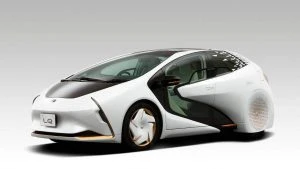Solid-State Batteries for EVs

The flourish of new electric vehicles (EVs) and hybrids on the auto markets hint towards the diminishing of fossil fuel use. EV sales have a long, long way to go before outselling vehicles with internal combustion engines (ICEs), but the goals have been set by international emission standard agreements. Certainly, doing away with EV range anxiety, the liquid lithium-ion batteries proneness to catching fire, having EVs with brief recharging times that are in line with current ICE refuelling times, and have pricing parity between a new EV and an equivalent new ICE vehicle would make a world of difference in the minds of people on the lookout for a new car. Once these EV problems have been solved, perhaps consumers will genuinely buy into an all-EV future.
The good news for EV enthusiasts is that essentially every big automotive manufacturer in the world has unveiled its fleet’s electrification plans and zero-emission target dates. Some manufacturers have even gone further, declaring that gasoline and diesel engines would no longer be available in their model line-ups by 2050. And, in order for these claims to become reality, some big landmark advancements in the EV future are being made right now, with huge money currently being pumped into various manufacturer’s kitties to research and create the perfect solid-state battery – especially designed for use in EVs.
One automotive manufacturer with a big sway in what goes down in the automotive world is Toyota, and they have pumped billions into creating a solid-state battery for use in their future hybrid vehicles and EVs. A version of Toyota’s LQ Concept, which first debuted at the 2019 Tokyo Motor Show, is now using working solid-state batteries, and has been doing so since June 2020. Toyota has been collecting all the performance data from the solid state batteries in the LQ for research, development, and better solid-state battery designs. The LQ Concept car is unlikely to end up as a production vehicle, however the solid-state batteries inside the car, and their development, will be used as a blueprint in Toyota’s new hybrid vehicles and EVs soon to make an appearance on the market for buyers to purchase.

Toyota LQ Concept Solid-State
Toyota’s quick development of solid-state batteries for use in all their hybrid and electric vehicles by 2030 is a sign of the ramping up in EV production that is happening not only at Toyota but in all other big global automotive brands who are boosting investments in the anticipation of greater EV and hybrid vehicle consumerism.
What battery type does Tesla use? Currently, Tesla has been using heavy liquid lithium-ion battery technology. However solid-state batteries are really the next step in clever battery technology, especially for EVs. Why? Solid-state batteries offer much better energy density, which leads to smaller, lighter batteries for cars but with a vastly improved range before recharging is necessary. Solid-state batteries will also be able to recharge from empty (flat) to 80 % in just 15 min – not anywhere between 2 to 10 hours that is currently the norm, if you can find a spare fast charger to park up at.
The good news for solid-state batteries doesn’t stop here either, because solid-state batteries are inherently safer due to the lack of flammable liquid electrolytes that you’ll find in liquid lithium-ion batteries. You may have heard of various electronic devices bursting into flame? Well, liquid lithium-ion batteries bursting into flame and causing fires in various EVs over the last couple of decades has been an issue. This in itself has deterred many people away from buying into EVs altogether.
So, big dollars are being spent in the design of solid electrolyte batteries (solid-state batteries) that are stable, chemically inert, and still a good conductor of ions between the electrodes. In essence solid-state batteries will be doing away with the slopping, flammable liquid lithium-ion electrolyte battery designs.
By default, solid-state batteries are more stable, but they are also more compact in design, and therefore lighter. Solid state batteries thus pack more energy output into the same amount of storage space that heavier and lower-output liquid lithium-ion batteries require. Because solid-state batteries are lighter, they have more energy density, offer more range, and deliver a better power to weight ratio, and they also recharge faster.
Solid-state batteries have been used in small electronic devices like pacemakers (an amazing bit of life-changing tech) as well as radio frequency identification (RFID), and wearable devices for years. Having fewer bits and pieces involved in the solid-state battery design means fewer things are present to go wrong. In addition to their improved safety, size, and stability, solid-state batteries in EVs would also offer faster charging times, more travel range, and even greater energy density.
Solid electrolytes in solid-state batteries can even be composed from a number of everyday materials – even ceramics and glass. The challenge to making solid-state batteries viable, however, is developing the technology that is commonly used in small devices and applying it to large-scale applications like in an EV. Currently, solid state batteries are expensive to fabricate because they have been prone to cracking, which has been a result of the brittleness of the electrolytes inside the battery expanding and contracting during continual use. The new research and development is setting out to change this.
Toyota is cracking the problem and will be using their solid-state batteries in their new range of hybrid vehicles first, which is an ideal testing ground for their fully-kitted EVs soon. Volkswagen is also promising that they will have solid-state batteries in use and in their cars by 2024. Like Toyota and Volkswagen, BMW anticipates that solid-state batteries could make it into production cars by 2025. Tech giants Samsung and Panasonic are working away at creating a range of solid state batteries that automakers will be able to use. Toyota has partnered with Panasonic to pave the way to an EV future.